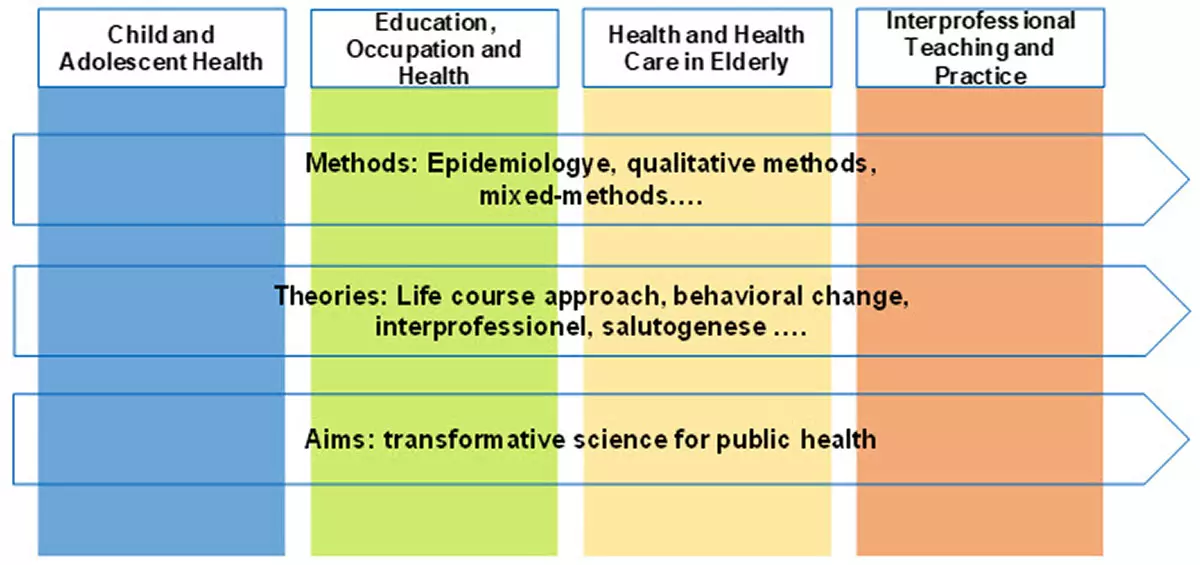Public Health Research

“Public health needs diversity and a multidisciplinary approach. With our research, we pursue a broad perspective that aims to consider vulnerable groups as well as vulnerable times in people’s lives, making a substantial and sustainable contribution to public health.”
Julia Dratva, Head of the Public Health Research Unit
The Public Health Research Unit designs and carries out studies on population health, health promotion and prevention, and the provision of health care.
The team of the Public Health Research Unit designs, acquires, and conducts scientific studies in the public health domain. The research team deals with questions of health promotion and prevention, epidemiology of health problems and determinants, and health systems and health care in different contexts and life stages.
Main Research Areas
The Public Health Research Unit consists of a multi-disciplinary team, which is also reflected in the diversity of the research questions addressed. It possesses broad know-how in both quantitative-statistical and qualitative research methods and many years of expertise in its topic areas.
The main research topics are represented by the following topic areas:

Child and Adolescent Health (CAH)
This topic area deals with determinants as well as the care and distribution of health and disease in children and adolescents. The focus of our work is on mental health and noncommunicable chronic diseases, as well as on the health competencies of parents and other key persons in childhood and adolescence. Surveillance, in the sense of performing representative studies on children and youth health and health reporting, is a specific focus of this group.
- Helping children grow: An interdisciplinary study on dealing with ADHS (in german only)
- Digital guide for parents (in german only)
Education, Work, and Health
This topic area deals with research in the fields of disability, the labour market, education economics, labour market sociology, and occupational health management. For example, the project “Risikofaktoren einer Invalidisierung bei jungen Erwachsenen” (Risk factors of disability in young adults) investigates what factors increase the risk of early retirement in young adults with health impairments. Another example is the project “Gesundheitliche Ungleichheiten im Kontext einer Verlängerung des Arbeitslebens” (Health inequalities in the context of prolonging working life), which studies the consequences of prolonging working life for older employees with health problems.
Geriatric Health and Health Care for the Eldery
To improve the health of the elderly population, we conduct research in collaboration with other research groups on various aspects of health care in this age group. Current projects focus, for example, on quality in home care (Spitex) or pain reduction for elderly people with dementia in care homes.
- Quality in home care (Spitex) (in german only)
- Pain reduction for elderly people with dementia in care homes (in german only)
Interprofessional teaching and practice
Interprofessional teaching and cross-professional cooperation in practice situations are closely linked. The focus of our research efforts in this topic area is, on the one hand, on delivering interprofessional competence to students, practitioners, and teachers, both at school/university and at work. On the other hand, we study the impact of interprofessional education and collaboration of the health professions on the health care system. In doing so, we are guided by the discussion paper "Guidance on Global Interprofessional Education and Collaborative Practice Research."
- Promotion of interprofessional Cooperation in Everyday Practice (in german only)
- Centre for Interprofessional Teaching and Practice (in german only)
- Guidance on Global Interprofessional Education and Collaborative Practice Research: Discussion Paper
Projects and Publications
The research unit conducts commissioned research and its own research projects in the focus areas and on public-health-related issues.
All research projects and publications are listed in the ZHAW project and publication database by start date of project or by publication date.
- Project database
- Publications (in german only)
Research Partners and Clients
Together with our cooperation partners, we develop research questions relevant to public health and collaborate in studies. We develop research designs for clients and practice partners, conduct investigations, and document the results as required. We provide support and evaluate projects and development processes.
We are aided in our efforts by a broad spectrum of quantitative and qualitative research methods and modern infrastructure, interdisciplinary networks within ZHAW, and close ties with international experts in various fields.
We collaborate on various interdisciplinary projects with the Department of Health Sciences Occupational Therapy, Nursing Sciences, Physiotherapy, and Midwifery research units.
Our Research Team
The research team is multidisciplinary in nature and consists of qualified scientists from the social sciences and public health, namely sociology, psychology, public health, medicine, physiotherapy, and economics, with a broad range of expertise in both quantitative-statistical and qualitative research methods. The research unit transfers new knowledge through cooperation with practice partners, scientific conference contributions, scientific publications, events and publications for the general public, and teaching.
The Public Health research unit is supported by other scientists associated with the Institute of Public Health.
- Public Health Research Unit (in german only)